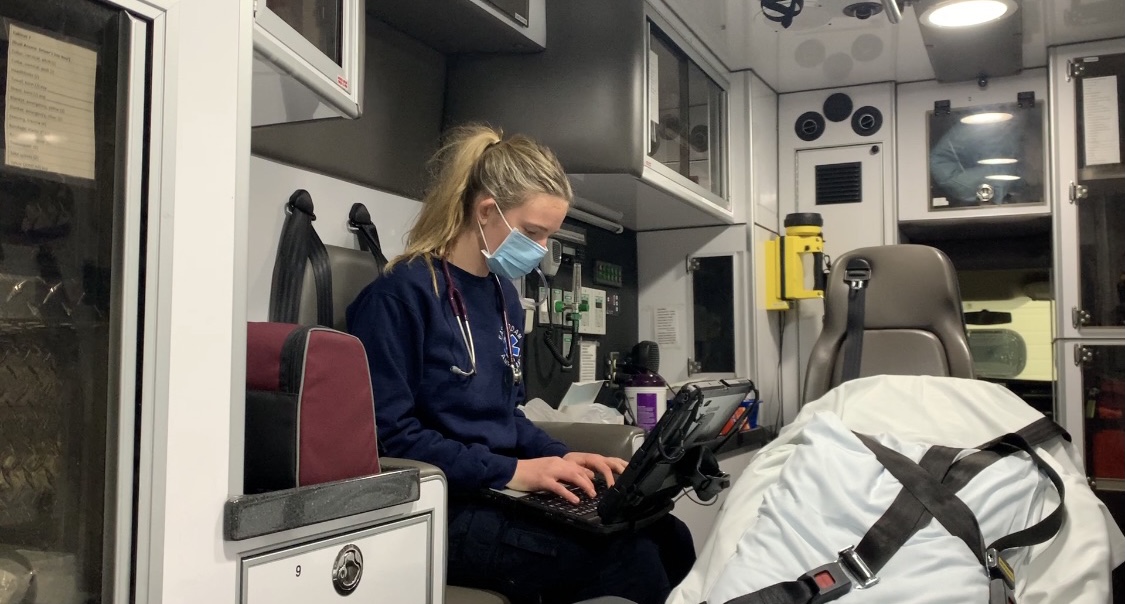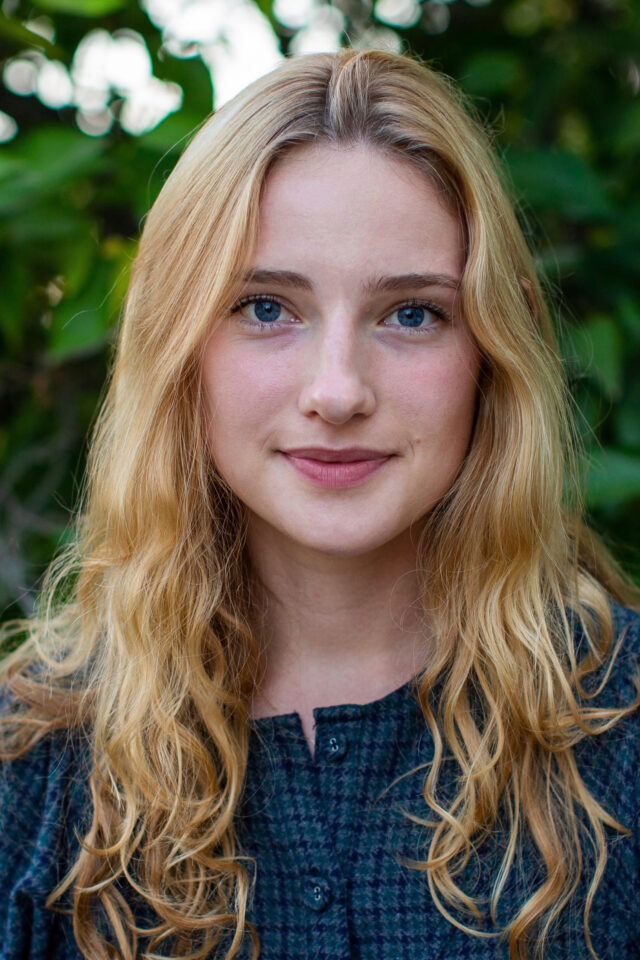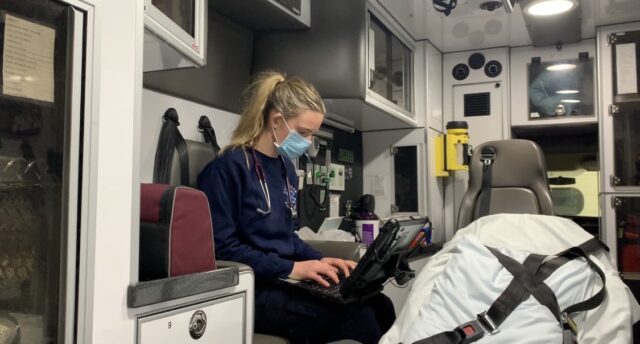Watson Fellow Cox ’22 to Explore Pain Management in Various Cultures


In April 2019, Middlesex County EMT Livia Cox ’22 recalls responding to a medical call where she encounters an unconscious and pale-faced patient. She eyes a pill bottle in the room, and although the man is dead, she begins chest compressions anyway “with every joule of energy and every compassionate bone in me,” she says.
Cox had met this patient before. They’ve discussed his comorbid chronic physical and mental pain and substance dependency at length. A former military man, he has frequent PTSD episodes. He’s been prescribed opioids to ameliorate his joint pain, but help more with his insomnia.
“On the dark and winding road back to the station, I thought about how I’ll document his death: ‘death by overdose.’ But I don’t think that tells the whole story; opioids weren’t the sole causal agent,” she says. “I think about how as a society, we honor those who died in combat, but fail to care for those who didn’t. And I think about the ways in which I, as an EMT, am complicit in this—providing transport, preventing death, but perpetuating a system that fails to address or consider the malady’s root cause.”
As the recipient of a 2022 Thomas J. Watson Fellowship, Cox will spend a year exploring the cultural and political valences of pain and cultural and societal responses to it. How is pain experienced and understood in different cultures? How do we talk about pain? Should the individual or society be responsible for attending to pain? How does religion play a role in pain management?
By visiting hospitals, pain clinics, drug consumption rooms, and treatment centers; learning from doulas, plant experts, and traditional healing practices, Cox hopes to answer such questions and better understand how pain is managed, fought, accepted, celebrated, and ignored.
Through her work as an EMT, personal experiences, and science in society major coursework, Cox, of Amherst, Mass., has learned that pain is a deeply complicated subject, “bound up with every part of our social apparatus and cultural understandings,” she said. “My Watson year will be a sustained and earnest journey, that will take me places not just physically, but cognitively and emotionally. This extraordinary opportunity for wide and deep exploration and connection will enhance my understanding, broaden my capacity for compassion, and increase my flexibility of mind. I believe that this year will change me and empower me to rise more effectively to the challenges I am committed to addressing.”
Her proposed project, titled “Pain, Policy, and the Person” will take her around the world to Belgium, Bolivia, Canada, Kenya, Peru, Switzerland, Togo, and Vietnam.
The Thomas J. Watson Fellowship is a one-year grant for purposeful, independent exploration outside the United States, awarded to graduating college seniors. It comes with a $36,000 stipend.

The 54th Class of Watson Fellows comes from 21 states and eight countries. Combined, they’ll travel to 73 countries pursuing topics ranging from automation to pollination; from architectural heritage to compulsory voting; from community science to youth incarceration; from activist filmmaking to eldercare. View Wesleyan’s past Watson Fellows here.
“Livia’s proposed topic of ‘Pain, Policy, and the Person’ is deeply complex and culturally determined,” said Andrew Quintman, associate professor of religion and Watson Fellow applicant interviewer. “I was impressed at first by her expansive background in emergency medicine and her prior work with community medicine in Ecuador. But in speaking with Livia it became clear that her obvious academic talents are matched by a sensitivity and poise in the face of human suffering. She will certainly learn much about the diversity of approaches to describing, diagnosing, managing, and treating pain. But at a deeper level, this Watson project addresses questions of identity formation and the very nature of selfhood, pointing to the fundamental issue of what it means to be an embodied human.”
Kenyans, Cox explains, generally, forgo the option to use an epidural during childbirth. By shadowing a doula for eight weeks, Cox hopes to speak with patients and families about the cultural significance of childbirth-associated pain, and holistic pain management techniques during childbirth. In a conversation with a doula from Nairobi, Cox learned that it’s “healthiest” to experience pain at home. “This idea of the importance of where pain is experienced intrigues me,” Cox said.
Although Bolivia has an extremely low opioid prescription rate compared to the rest of the continent, substance abuse— particularly alcohol—makes up the majority of the country’s psychiatric hospitalizations. While there, Cox will spend six weeks at a palliative care unit learning what makes opioids taboo and how clinics address pain-reducing measures in the absence of narcotics.
In Canada, Cox will volunteer as an intern with the Inuuqatigiit Center for Inuit Children, Youth, and Families’ Katujjiqatigiit Mental Wellness Program, which provides trauma-informed mental health and addiction services to Inuit youth and teens.
In Peru, Cox will work with the non-profit organization El Centro de Medicina Andina and better understand how Peruvians use medicinal plants to alleviate pain. “I know that the pathways of use of analgesic plants by rural people offer an important window into the experience of pain and attitudes toward it among people not always centered in mainstream medical discussions of pain.”
In Togo, Cox will explore the religious and magical dimensions of pain by observing Vodou approaches; in Belgium, she’ll learn about public Drug Consumption Rooms that are supervised by trained staff; in Vietnam, Cox will learn about Confucianist and Buddhist perspectives on pain; and in Switzerland, she will study the law that enables people with chronic pain or a terminal illness to self-administer a lethal pill to commit suicide, without the participation of a medical professional. “I am curious about the dissolution of the stigma often associated with choosing to end one’s life and the switch in discourse away from pain as a thing to fight and conquer,” she said.
This rigorous Watson journey will likely come with setbacks, but Cox is ready for the risks. “I think that I thrive in environments where I feel challenged,” she said. “This year is all about going into challenging situations and asking challenging questions, but also challenging my own instinctual answers to those questions, and perhaps even challenging my project itself.”
Cox, who is double majoring in science in society and neuroscience, credits a few Wesleyan courses that helped influence this project: The Health of Communities, Race and Medicine in America, Critical Approaches to Disease and Epidemics, and Methods and Frameworks for Understanding and Overcoming Health Disparities. She plans to pursue a MPH in health policy at Yale University upon completing her Watson Fellowship. Ultimately, she’s hoping to apply to medical school and continue her work with the Middletown Harm Reduction Initiative, which she co-founded while a student at Wesleyan.
“At 21, I play multiple roles in a flawed healthcare system, unable to reconcile that which I experience with that which I envision,” she wrote in her Watson project proposal. “But, at 31, with degrees in medicine and public health, I want to be creating policies that will make a difference.”

